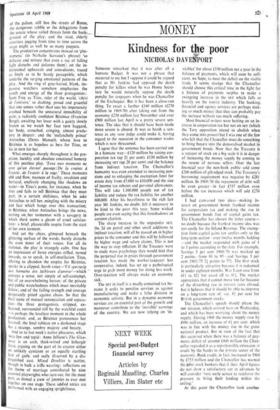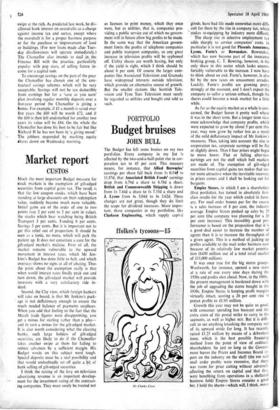Kindness for the poor MON EY
NICHOLAS DAVENPORT
Someone remarked that it was after all a humane Budget. It was not a phrase that occurred to me but I suppose it could be argued that as Mr Jenkins had opposed the death penalty for killers when he was Home Secre- tary he would naturally oppose the death penalty for taxpayers when he was Chancellor of the Exchequer. But it has been a close-run thing. To exact a further £340 million (£270 million in 1969-70) after taking out from the economy £250 million last November and over £900 million last April is a pretty severe sen- tence. The idea that it should have been made more severe is absurd. It was as harsh a sen- tence as any sane judge could make it, having regard to the recession in the consumer trades which is now threatened.
I agree that the sentence has been carried out in a humane way—£120 million by raising cor- poration tax (up 2+ per cent), £130 million by increasing SET (up 28 per cent) and the balance from indirect taxation. The Chancellor's humanity was even extended to increasing pen- sions and to enlarging the exemption limit for estate duty from £5,000 to £10,000 and the size of income tax rebates and personal allowances. This will take 1.100.000 people out of tax liability and reduce the tax liability for another 600,000. After his beastliness to the rich last year Mr Jenkins, no doubt, felt it necessary to be kind to the poor this year. Some wicked people are even saying that this foreshadows an autumn election.
The sharp increase in the unpopular SET, the 2d on petrol and other small additions to indirect taxation, will all be passed on in higher prices to the consumer and this will be followed by higher wage and salary claims. This is not the way to stop inflation. If the Treasury were to study mass psychology they would find that the perpetual rise in prices through government taxation has made the worker-taxpayer less cooperative, indeed, has set up a pathological urge to grab more money for doing less work. Over-taxation will always make an economy sick.
The SET in itself is a madly conceived tax be- cause it seeks to penalise services as against manufacturing and make a false division in economic activity. But in a dynamic economy services are an essential part of the growth and moreover contribute to the 'invisible' earnings of the country. We are now relying on 'in-
visibles' for about £350 million net a year in the balance of payments, which will soon be suffi- cient, we hope, to meet the deficit on the visible trade. It seems strange that the Chancellor should choose this critical time in the fight for a balance of payments surplus to make a
swingeing increase in the SET which falls so heavily on the tourist industry. The banking,
financial and agency services are perhaps mak- ing so much money that they can probably pay the increase without too much suffering.
Most financial writers were betting on an in- crease in corporation tax but not on SET (which the Tory opposition intend to abolish when they come into power) but I was one of the few who felt that the Chancellor must do something
to bring buyers into the demoralised market in government bonds. Now that the Treasury is a repayer of stock on a big scale it is in danger of increasing the money supply by coming to the rescue of nervous sellers. Over the last financial year the non-bank public sold some £200 million of gilt-edged stock. The Treasury's borrowing requirement was negative by £281 million. In 1969/70 the repayment of debt will
be even greater—in fact £537 million even before the tax increases which will add £270 million.
I had canvassed two ideas—making in- terest on government bonds franked income for corporation tax and making the rise in
government bonds free of capital gains tax. The Chancellor has chosen the latter course—
no doubt because the franked income idea was too costly for the Inland Revenue. The exemp- tion from capital gains tax applies only to the long-term section—over twelve months holding —and the market responded with gains of 1 to 3 points according to the date. For example, Savings 3 per cent 1960/70 was marked up 2 points—from 93 to 95—and Savings 3 per cent 1965/75 21 points to 751. The first stock is particularly attractive because it is redeemed , in under eighteen months. War Loan rose from 411 to 421 but eased off to 411. The market appreciates that it cannot move too far because of the disturbing rise in interest rates abroad, but it believes that it should be able to improve on a long-term rate of, say, 81 per cent for British government stocks.
The Chancellor's speech should please the IMF mission, which arrived here on Wednesday,
and which has been worrying about the money supply. During 1968 the money supply rose by £986 million, an increase of 6-1 per cent, which was in line with the money rise in the gross national product. But in view of the fact that this occurred when there was a balance of pay- ments deficit of around £460 million the Chan- cellor regarded it as a reprehensible extension of credit by the banks to the private sector of the economy. Bank credit, in fact, increased in 1968 by £753 million and the Chancellor has warned the Ofint stock bankers that if their April figures do not show a satisfactory cut in advances he will consider 'very early action to reinforce the pressure to bring their lending within thz ceiling.'
At this point the Chancellor took another
swipe at the rich. As predicted last week, he dis- allowed bank interest on overdrafts as a charge against income tax and surtax, except where the overdraft is for a proper business purpose or for the purchase or improvement of land or buildings. (For new loans made after Tues- day disalloWances will operate immediately.) The Chancellor also intends to deal in` the Finance Bill with the practice, particularly popular with pop stars, of selling future in- come for a capital sum.
To encourage savings on the part of the poor the Chancellor has chosen one of the con- tractual savings schemes which will be very acceptable. Savings will not be tax deductible from earnings but for a 'save as you earn' plan involving regular monthly deposits over a five-year period the Chancellor is giving a bonus. For example, if fl a month is saved over five years the £60 will be worth £72, and it the £60 is then left undisturbed for another two years its value will be £84. On the whole the Chancellor has done his best to be fair but like Richard II he has not been in 'a giving mood.' The jobbers responded by marking equity shares down on Wednesday morning.











































 Previous page
Previous page